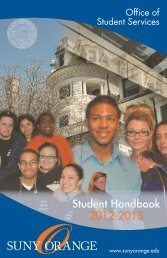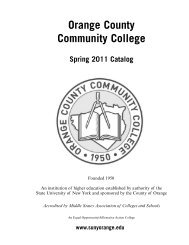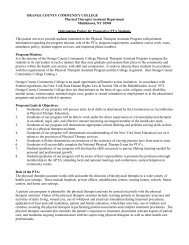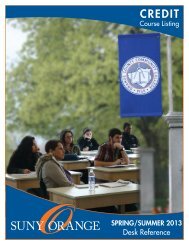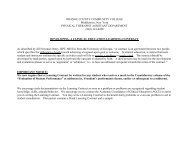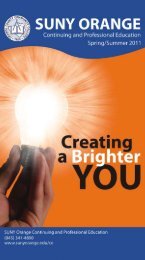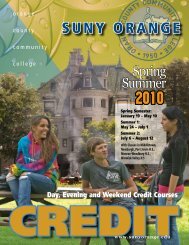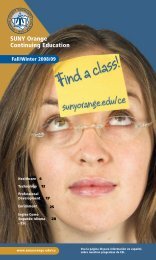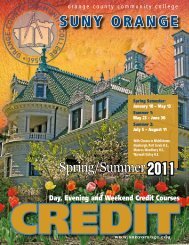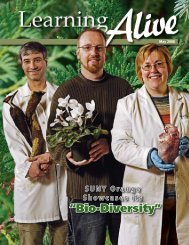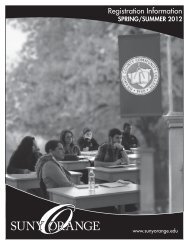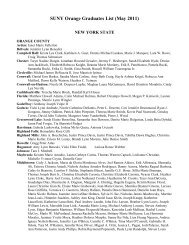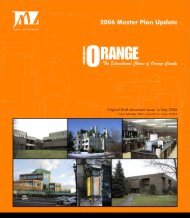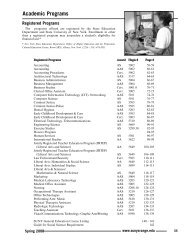You also want an ePaper? Increase the reach of your titles
YUMPU automatically turns print PDFs into web optimized ePapers that Google loves.
Biology<br />
BIO 120—Biology for Today<br />
3 lect., 0 lab., 3 cr. (Spring)<br />
The biological aspects of contemporary problems<br />
and issues will be explored. Selected topics will be<br />
chosen from the areas of Medicine and the<br />
Environment. Students will participate in discussions<br />
and class activities that will assess decision-making<br />
criteria relative to the issues being presented.<br />
BIO 120 DL—Biology for Today<br />
3 lect., 0 lab., 3 cr. (Spring)<br />
The biological aspects of contemporary issues will be<br />
explored. Selected topics will be chosen from areas of<br />
the environment, human anatomy and physiology,<br />
inheritance, evolution, and genetic engineering.<br />
Proctored exams will be administered at an <strong>SUNY</strong><br />
<strong>Orange</strong> campus or an approved site arranged by the<br />
student.<br />
BIO 123—Prehistoric Life<br />
3 cr. (Fall/Spring/Summer)<br />
A survey of the diversity of prehistoric life<br />
including the dinosaurs, mammals, birds, reptiles,<br />
amphibians, fish, invertebrates and plants of the past.<br />
An overview of other relevant topics such as<br />
fossilization, evolution, extinction, vertebrate<br />
anatomy and ecosystem structure will be presented.<br />
The course will include a trip to the Museum of<br />
Natural History. Students are responsible for their<br />
own transportation. The course does not include a<br />
laboratory component.<br />
BIO 123 DL—Prehistoric Life<br />
3 lect., 0 lab., 3 cr. (Fall/Spring/Summer)<br />
A survey of the diversity of prehistoric life<br />
including dinosaurs, mammals, birds, reptiles,<br />
amphibians, fish, invertebrates, and plants of the past.<br />
An overview of other relevant topics such as<br />
fossilization, evolution, extinction, and vertebrate<br />
anatomy will be presented. The course will include a<br />
trip to the Museum of Natural History. Students are<br />
responsible for their own transportation. The course<br />
does not include a laboratory component. Proctored<br />
exams will be administered at an <strong>SUNY</strong> <strong>Orange</strong><br />
campus or an approved site arranged by the student.<br />
BIO 125—Nutrition 3 cr. (Fall/Spring/Summer)<br />
Students study carbohydrate, fat, protein, mineral<br />
and vitamin requirements; an overview of the<br />
chemical and biological body functions, nutrient<br />
metabolism and deficiencies, food safety legislation,<br />
functions of the Food and Drug Administration and<br />
the USDA. Students conduct a caloric self-study.<br />
BIO 141—The Diversity of Life<br />
2 lect., 3 lab., 3 cr. (Fall/Spring)<br />
This course offers the non-science major an<br />
opportunity to study representatives of the major<br />
groups of bacteria, protistans, plants, fungi, and<br />
animals in both lecture and lab. Emphasis will be<br />
placed on the major characteristics of each group.<br />
The inter-relationships among these organisms will be<br />
studied both through discussion and through field<br />
trips to local sites. The global loss of biodiversity and<br />
its significance will be discussed. Students are<br />
responsible for their own transportation on field trips.<br />
(GE 2)<br />
BIO 143—Field Biology 2 lect., 3 lab., 3 cr. (Fall)<br />
This course will acquaint students with the plants<br />
and animals of the <strong>Orange</strong> County area, with<br />
emphasis on ecological relationships between them<br />
and their environment. Weekly field trips within the<br />
area will identify organisms found and conduct<br />
outdoor studies to better understand interactions<br />
among them. Real data will be collected and analyzed<br />
to answer scientific questions concerning the natural<br />
history of the county's biodiversity. Students are<br />
responsible for their own transportation. (GE 2)<br />
BIO 146—Avian Biology<br />
2 lect., 3 lab., 3 cr. (Spring-alternate years)<br />
A study of the birds of the Mid-Hudson Region,<br />
emphasizing field identification, migration, flight and<br />
ecological adaptations, voice and behavior,<br />
distribution and classification. Lectures and weekly<br />
field trips to diverse habitats are included. Students<br />
are responsible for their own transportation.<br />
BIO 148—Environmental Conservation<br />
2 lect., 3 lab., 3 cr. (Spring)<br />
This course will explore local, regional, national,<br />
and global issues of water quality and usage, such as<br />
types and sources of pollutants and their effects on<br />
humans and wildlife, surface and ground water<br />
overuse, and conservation of water resources. The<br />
expanding human population and its creation of<br />
resource conflicts and their resolutions are presented<br />
and discussed. Lab experiences will focus on<br />
monitoring the quality of nearby waterbodies, with<br />
the collection of real data that will be used by <strong>Orange</strong><br />
County in their formulation of a watershed<br />
management plan. Students are responsible for their<br />
own transportation to off-campus sites. (GE 2)<br />
BIO 201—Genetics 3 lect., 3 lab., 4 cr. (Fall)<br />
This is a survey course which introduces students to<br />
the various fields of modern genetics. Topics include<br />
the diverse forms of inheritance, the structure of<br />
chromosomes, the nature of function of genes, the<br />
regulation of gene activity, mutation, biotechnology,<br />
and evolution. Special reference is made to human<br />
genetic disorders and cancer. Lab work includes<br />
observing the inheritance traits in fruit flies and<br />
plants, mapping genes to regions of chromosomes,<br />
transformation, conjugation, plasmid DNA isolation,<br />
DNA gel electrophoresis, and protein gel<br />
electrophoresis. Students will learn techniques for the<br />
handling of bacteria and bacteriophage. (GE 2)<br />
Prerequisite: one year of biological science including<br />
BIO 101<br />
Spring 2012<br />
www.sunyorange.edu<br />
175



